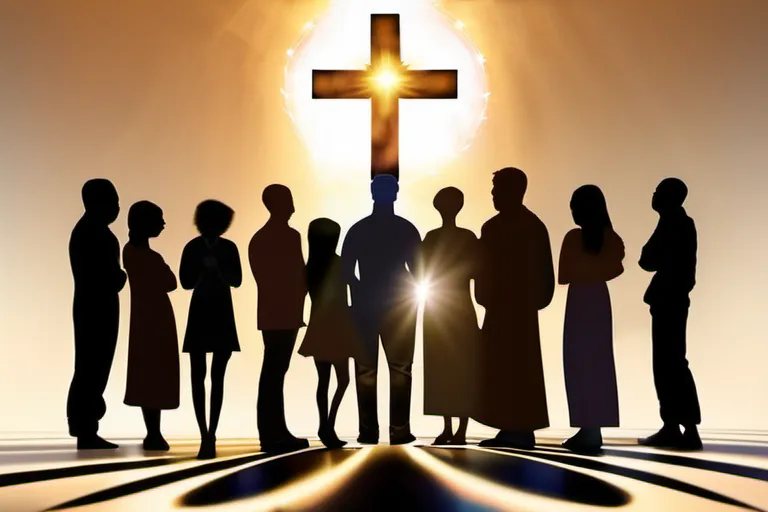Exploring the Concept of a Global Faith System and Its Implications
In this article, we delve into the intriguing question: is there a universal religion that transcends cultural and geographical boundaries? We’ll examine various perspectives, historical evidence, and contemporary debates to provide a well-rounded understanding of this complex topic.
The Historical Context: Ancient Religions and Universal Themes
The idea of a universal religion has intrigued humanity for millennia. Could it be that deep within our ancient myths and rituals, there lay the seeds of a single, all-encompassing faith? Imagine if every culture, regardless of its geographical or temporal boundaries, shared some core beliefs or practices. Would this not hint at a profound unity in human experience?
Let’s delve into the historical context. In ancient times, religions were often interconnected through shared myths and symbols. For instance, consider the Pantheon, where gods from various cultures found themselves sharing the same cosmic stage. This intermingling of divine figures suggests a commonality in human spirituality that goes beyond mere coincidence.
Moreover, the concept of reincarnation or transmigration of souls is found across many ancient religions—Hinduism, Buddhism, and even some Greek beliefs. This belief system challenges us to question what makes one religion ‘different’ from another. Are we not all part of a grand cycle of existence?
The shared practices of ritual sacrifices and pilgrimages also indicate a deeper connection. Think about the significance of pilgrimage sites like Mecca or Jerusalem, which are revered by millions across different religions. These places serve as metaphors for the journey towards spiritual enlightenment, highlighting universal themes that transcend cultural boundaries.
As we explore these ancient shared beliefs and practices, we wonder if they might indeed be laying the foundation for a universal faith system. Could it be that, through understanding our collective history, we are closer to realizing this grand vision?
The answer may lie in the depths of human spirituality itself. What do you think—could there be a universal religion waiting to emerge from the rich tapestry of ancient beliefs and practices?
Modern Perspectives: Defining a Universal Religion
Modern Perspectives: Defining a Universal Religion
In contemporary times, the concept of a universal religion has gained significant traction. But what exactly does it mean to have a global faith system? Is it possible for diverse cultures and traditions to coalesce into one unified belief?
The quest for a universal religion isn’t new; it’s an age-old dream that many spiritual seekers harbor. Imagine if everyone on this planet shared the same values, practices, and beliefs—wouldn’t that bring about unprecedented harmony? Yet, defining such a religion presents its own set of challenges.
The strengths of a universal religion lie in its ability to foster global unity and understanding. It could potentially bridge cultural divides, promoting peace and cooperation among nations. However, these benefits come with limitations. How does one reconcile the vast array of beliefs, traditions, and practices found across different cultures? Does it mean watering down essential doctrines or creating a new set of rules that might not resonate with everyone?
A universal religion would need to be inclusive yet coherent. It must capture the essence of various spiritual paths while providing a clear framework for its followers. This balance is crucial, as imposing one’s beliefs onto others can lead to conflict and division.
In this era of globalization, where people are increasingly interconnected, the idea of a universal religion becomes more relevant than ever before. Yet, it remains a complex undertaking that requires careful consideration of diverse perspectives and needs. Can we achieve this ideal of global spirituality without compromising on individual beliefs?
The journey towards defining a universal religion is ongoing, with many spiritual leaders and thinkers actively exploring this path. The challenge lies in finding common ground while respecting the unique aspects that make each tradition special.
The Role of Technology in Facilitating Global Spirituality
How has technology transformed our spiritual landscapes, allowing us to transcend geographical boundaries and connect with people from different cultures? Is it through social media that we are beginning to experience a global spirituality, or is this just another passing trend?
Consider the way apps like Meditation Oasis or Headspace offer guided sessions in various languages, making spiritual practices accessible worldwide. Are these tools facilitating a universal religion by democratizing access to different forms of spirituality? Or are they merely providing temporary relief from daily stresses without fostering deeper spiritual connections?
The internet has also created online communities where people share their beliefs and practices. Is this virtual space helping us understand each other better, or is it turning into echo chambers that reinforce our existing views? Can we truly connect spiritually in cyberspace, or does the online/offline divide still pose significant challenges?
Moreover, how do streaming platforms like YouTube and Twitch contribute to this global spiritual landscape? Do they provide a stage for diverse voices and practices, or are they dominated by mainstream religions that might overshadow smaller or less recognized belief systems?
In exploring these questions, we can’t help but wonder if technology is not just facilitating the spread of spirituality but also shaping its future. Is it possible that in our interconnected world, spiritual practices will evolve into something more unified and accessible? Or are we merely witnessing a fragmentation of diverse spiritual traditions?
Challenges and Controversies: Balancing Unity and Diversity
Can we truly build a universal religion that respects every culture and tradition without losing its unique essence? This question looms large as we explore the concept of a global faith system. It’s like trying to fit all the pieces of a jigsaw puzzle into one giant frame, each piece representing a different culture or belief. But what if some pieces end up getting pushed aside or altered beyond recognition?
The potential pitfalls are vast and complex. For instance, cultural appropriation can easily slip in when elements from one culture are adopted by another without genuine respect or understanding. It’s like taking someone else’s favorite recipe and claiming it as your own—forgetting that the flavors come from a rich history of traditions and experiences.
Another challenge is the fear of losing diversity. Every religion carries within its folds unique stories, practices, and insights that are irreplaceable. When we strive for unity, there’s a risk that these precious differences could be overshadowed or even erased. How do we balance the desire for a universal faith with the need to preserve the rich tapestry of human spirituality?
Consider the metaphor of a river. Just as a river adapts and carries different sediments from its diverse sources, a global religion must also find ways to incorporate and respect all these diverse flows without losing its direction or strength. The key lies in finding a harmonious flow that acknowledges and celebrates every tributary.
Ultimately, the journey towards a universal religion is fraught with challenges, but it’s not an endeavor we should shy away from. It requires thoughtful dialogue, mutual respect, and an openness to learn from each other. After all, isn’t the essence of spirituality about connecting deeper, rather than homogenizing our diverse human experiences?
Case Studies: Examples of Universal Spiritual Movements
Imagine a world where people from every corner of the globe share a single spiritual language, a common set of beliefs that transcends cultural and geographical boundaries. Could such a universal religion truly exist? Let’s dive into some real-world examples to explore this concept.
The Bahá’í Faith is one of the most compelling cases for a universal religion. Founded in the 19th century by Bahá’u’lláh, it claims to be a continuation and culmination of all previous religions, aiming to unite humanity under its banner. The Bahá’ís believe in the oneness of God and the unity of all humankind. This belief system promotes peace, unity, and social justice, emphasizing that religious differences should not divide but rather bring people closer together.
Another fascinating example is the Unitarian Universalist Association (UUA). Unlike traditional religions with strict doctrines, UUA encourages its members to find their own paths to spirituality while valuing diversity of belief. It’s a perfect illustration of how a universal religion can coexist with individual freedom and choice. Members are encouraged to ask questions and seek answers in their own way, making it a vibrant community that welcomes individuals from various backgrounds.
Both these movements present intriguing solutions to the challenge of creating a global faith system. The Bahá’í Faith attempts to harmonize different spiritual traditions into one cohesive framework, while UUA embraces diversity within its congregations. These examples suggest that a universal religion might not be about imposing a single doctrine but rather about finding common ground and fostering mutual respect.
Could these models inspire the creation of a truly global faith system in the future? Only time will tell, but they certainly offer valuable insights into how we can bridge the divides between cultures and beliefs. As we continue to explore the concept of a universal religion, it’s clear that there are many paths to unity, each with its unique strengths and challenges.
The Future of Global Unity and Spirituality
Imagine a world where every corner, from bustling cities to remote villages, shares a common spiritual language. Could such a universal religion truly unite humanity under one belief? It’s a fascinating idea that has intrigued thinkers and dreamers for centuries. Is it merely an idealistic mirage or could it be the key to global unity in our future?
Consider the globalization of culture—a phenomenon that blurs national borders, making us more interconnected than ever before. With this increasing interdependence comes a need for shared values and principles. A universal religion might act as a unifying force, much like how the internet has brought people together through common interests and experiences. Imagine a world where instead of conflicts over religious differences, we see cooperation and mutual respect flourishing.
Historically, many movements have sought to bridge cultural divides. From the Buddhist influence in East Asia to the spread of Islam across continents, religions often play pivotal roles in shaping global interactions. However, these movements typically remain rooted in their cultures, making it challenging for a truly universal religion to emerge. The question then arises: could technology and education accelerate this process?
The rise of digital platforms has already begun to break down barriers. Social media allows individuals from diverse backgrounds to connect instantly, sharing ideas and beliefs. This virtual connectivity might provide the foundation for a new, global spirituality that transcends traditional religious frameworks. Perhaps the future holds a hybrid religion, merging elements from various traditions into a flexible, inclusive practice.
The challenge lies in ensuring this potential universal religion remains open to all, without imposing strict doctrines or hierarchies. It must be a dynamic, evolving system that adapts to the changing needs of humanity. Only time will tell if such an ambitious vision can become reality, but the journey towards global unity through spirituality is undoubtedly worth exploring.
Conclusion
 By the end of this article, you will have gained insights into the concept of a universal religion, its potential benefits, challenges, and implications for global unity. Whether you’re a scholar, spiritual seeker, or simply curious, this guide offers valuable perspectives on one of humanity’s most profound questions.
By the end of this article, you will have gained insights into the concept of a universal religion, its potential benefits, challenges, and implications for global unity. Whether you’re a scholar, spiritual seeker, or simply curious, this guide offers valuable perspectives on one of humanity’s most profound questions.











